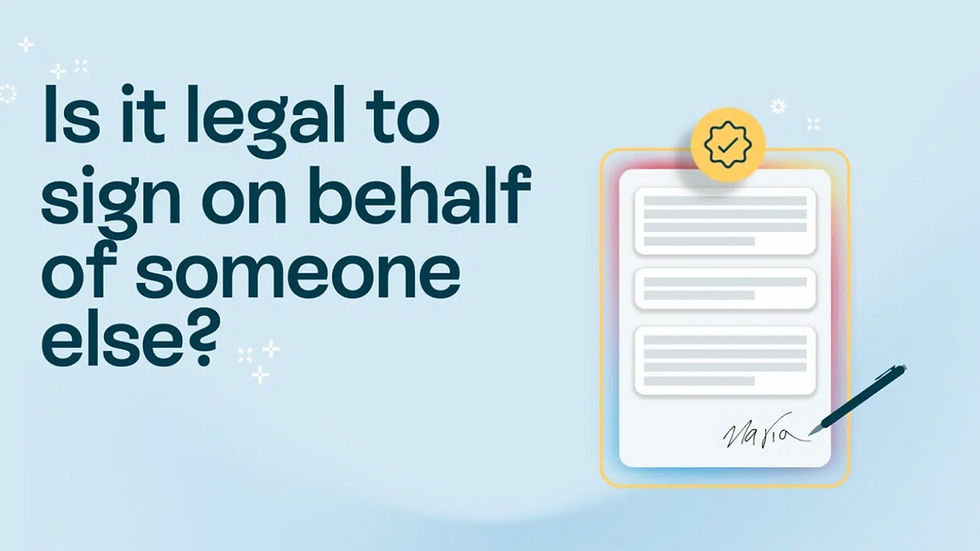Is It Illegal to Write a Letter in Someone Else’s Name?
- LetterLab

- Mar 24, 2025
- 3 min read
Updated: Mar 27, 2025

Writing a letter on behalf of someone else is common, whether it’s for a legal matter, an appeal, a job application, or even a personal letter. But is it actually illegal? The answer depends on intent, consent, and the nature of the letter.
If you have permission and are acting in good faith, such as writing a financial aid appeal letter for a relative or helping someone with a cover letter writing service—then there’s nothing illegal about it. However, if the letter involves fraud, deception, or misrepresentation, then it could lead to serious legal consequences.
Legal Source: According to the Forgery and Counterfeiting Act 1981, signing another person’s name without permission is considered forgery, a serious offence that can result in legal penalties.
Let’s break down the legalities of writing a letter in someone else’s name, when it’s acceptable, and when it could land you in trouble.
When Is It Legal to Write a Letter for Someone Else?
There are plenty of legitimate reasons why someone might need help writing a letter. In many cases, having a third party draft a letter is not only legal but also expected.
1. With Full Permission
If someone asks you to write a letter on their behalf and they review and approve it before sending, then it’s perfectly legal.
Client Example: A client once approached me needing a financial aid appeal letter but struggled to put their situation into words. They provided all the details, and I structured a professional, persuasive letter for them. With their approval, they submitted it, and within two weeks, they received a reconsideration on their funding.
2. Power of Attorney or Legal Representation
In some cases, people legally appoint someone to write letters on their behalf, particularly in legal or financial matters.
Legal Source: The UK Government’s Power of Attorney Guidelines state that an individual with Power of Attorney can legally sign documents and letters on behalf of another person.
Example: A solicitor can draft a letter to a judge on behalf of someone if they are legally representing that person in court.
When Is It Illegal to Write a Letter in Someone Else’s Name?
While writing a letter for someone else is usually fine, there are situations where it becomes illegal. The key factor is intent, if the letter is meant to deceive, defraud, or mislead, then it could be considered a crime.
1. Forgery or Fraud
If you sign someone else’s name without their permission, that’s considered forgery, which is illegal under the Forgery and Counterfeiting Act 1981.
Client Example: A client once contacted me after discovering that their landlord had forged a letter stating they had agreed to end their tenancy early. This was illegal and could have led to serious legal consequences for the landlord.
2. Misrepresentation or Deception
Even if you don’t forge a signature, misrepresenting yourself in a letter can still be illegal.
This includes:
Writing a reference letter for yourself and pretending it’s from an employer.
Filing a financial aid appeal with false information.
Submitting a legal letter under someone else’s name without their knowledge.
Legal Source: According to UK Consumer Protection Laws, providing false or misleading information in written communication can result in legal action or fines.
Example: A job applicant once asked if I could write a fake reference letter for them. I refused, as this would be dishonest and potentially illegal. If discovered, they could have been fired or even faced legal consequences.
How to Legally Write a Letter for Someone Else
If you’re writing a letter on behalf of someone, follow these guidelines to ensure it’s done legally:
Get their permission – Always have their explicit consent before writing a letter.
Use a clear authorisation statement – If necessary, include a line like:"This letter has been written on behalf of [Name] with their full consent."
Ensure accuracy – Never include false information.
Let them sign it – If possible, the person should sign the letter themselves. If not, indicate your role:"[Your Name], on behalf of [Their Name]."
Best Practice: If you’re unsure whether a letter should be written under someone else’s name, a professional letter writing service can ensure it’s done ethically and legally.
Final Thoughts
Writing a letter on behalf of someone is perfectly legal and common when done with honesty and permission. However, if the letter involves forgery, fraud, or misrepresentation, it could lead to serious legal consequences.
Client Success Story:A client once needed a character reference letter for court but wasn’t sure how to word it properly. We structured it carefully, ensuring it was persuasive and legally sound. The judge acknowledged the letter in court, and it played a role in securing a more favourable outcome.
If you need help writing a formal, persuasive, and legally sound letter, I can make sure it’s clear, professional, and ethical.
Need a letter written the right way? Let’s get started!



Comments